Publication Year
2016

Are Fuel Economy Standards Regressive?
December 29, 2016
The Corporate Average Fuel Economy (CAFE) program was introduced in 1975 with the objective of reducing gasoline consumption. Under CAFE, automakers are required to meet a minimum sales-weighted average fuel economy for their vehicle fleets. Fuel economy standards impose costs, but who bears those costs?

Study Shows Hydraulic Fracturing Boosts Local Economies
December 22, 2016
As hydraulic fracturing, or fracing, is poised to play an even more important role in the nation’s energy system in coming years, how can benefits at the national scale—such as lower energy prices, enhanced energy security, and lower air pollution and greenhouse gas emissions—be weighed against concerns that negative health and social impacts outweigh the economic benefits for local communities where drilling takes place?

E2e Project Update: Evaluating Energy Efficiency Upgrades to K-12 Public Schools in California
November 16, 2016
A new working paper by Fiona Burlig, Christopher Knittel, David Rapson, Mar Reguant and Catherine Wolfram1 studies the cost-effectiveness of energy efficiency investments in over 2,000 K-12 California public schools served by the Pacific Gas and Electric Company (PG&E).

Transatlantic Perspectives on Energy Storage: Technology, Policy and Finance
October 23, 2016
Energy storage will play a critical role in enabling the transition to low-carbon electricity systems, providing capacity, energy, and ancillary benefits to help secure a stable and reliable power supply. But even as the technology horizon evolves, the value of different storage technologies remains uncertain.
Lower Oil Prices and the U.S. Economy: Is This Time Different?
October 8, 2016
Between June 2014 and March 2016, the inflation-adjusted price of oil dropped by 66%, yet average U.S. economic growth accelerated only slightly from 1.8% at annual rates before the oil price decline to 2.2% thereafter. The fact that this decline in the price of oil failed to translate into faster U.S. economic growth has puzzled many observers who expected a boom in the U.S. economy.

Efficiency and Equity in Today’s Environmental Policy
September 30, 2016
The economics rationale for environmental regulation is simple and strong: private decisions about how much to pollute lead to socially undesirable levels of pollution. We need policy to correct this flaw in markets. The question is, which policies?

Predicting the Unpredictable – Handling Uncertainty in Energy Economics and Management
September 12, 2016
Together with partners from German utility and CEEPR Associate Energie Baden-Württemberg AG (EnBW), the University of Duisburg-Essen and the Stiftung Energie & Klimaschutz, MIT CEEPR organized a conference on September 8th and 9th, 2016 to discuss analytical tools and decision making strategies for dealing with uncertainty in energy policy, economics and management.

The Economics of Unconventional Oil Development
September 1, 2016
According to the latest energy outlook from the U.S. Energy Information Administration, tight oil production was 4.28 Mb/d for 2014 and 4.89 Mb/d for 2015. It is projected to fall to 4.27 Mb/d for 2016. A recent CEEPR working paper by Robert Kleinberg, Sergey Paltsev, Charles Ebinger, David Hobbs, and Tim Boersma offers an investigation into this phenomenon.

The Rise of NGO Activism
July 12, 2016
In a recent MIT CEEPR working paper, we start with the observation that, since the mid-twentieth century, public regulators have lost public trust. Recent catastrophes, such as the global financial crisis, the explosion of the Deepwater Horizon oil-drilling rig, and the Fukushima disaster, have reinforced this dynamic, raising questions about the independence of the agencies involved.
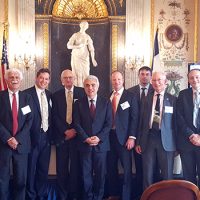
2016 CEEPR-EPRG European Energy Policy Conference
July 10, 2016
On July 7th and 8th, 2016, CEEPR cooperated with EPRG and Electricité de France to convene the 2016 European Energy Policy Conference in Paris, France. Over 70 participants from research, industry, and the public sector converged at the historic George C. Marshall Center for a varied program covering key topics in the energy and environmental policy arena.

2016 Spring Research Workshop
May 30, 2016
In the development of energy and environmental policy, cooperation between research, industry and policy making is critical. This message was central to the work presented and discussed at the MIT Center for Energy and Environmental Policy Research (CEEPR) 2016 Spring Research Workshop.

MIT joins Carbon Pricing Leadership Coalition
May 20, 2016
MIT has formally joined the Carbon Pricing Leadership Coalition, a global partnership of governments, businesses, and civil society organizations working together with the goal of applying a price on carbon emissions, the predominant cause of climate change.

Emissions Trading in North America and Beyond
May 10, 2016
Against the backdrop of a recent U.S.-Canada Joint Statement on Climate, Energy, and Arctic Leadership that emphasized the role of carbon trading in North American climate cooperation, MIT CEEPR convened a timely high-level event on the prospects for emissions trading and carbon market linkage in Canada and the United States.

University Energy Initiative Symposium
May 1, 2016
On April 29, 2016, CEEPR and the Alfred P. Sloan foundation convened a symposium for the leadership and management of major energy economics and policy research initiatives across the United States.

The E2e Project Awarded $5 Million Grant to Evaluate New Advanced Energy Monitoring System
April 24, 2016
The E2e Project is in the process of launching the largest demonstration and evaluation of an innovative energy monitoring system for industrial facilities.
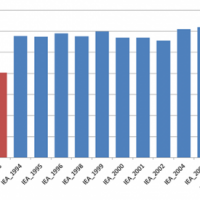
Energy Scenarios: The Value and Limits of Scenario Analysis
April 15, 2016
Energy scenarios are a useful tool for industry experts, government officials, academic researchers and the general public to assist in policy-making, planning and investment decisions. Such scenarios provide projections on a wide range of issues, including production, consumption, trade, prices, investments, technology mixes, and many others.
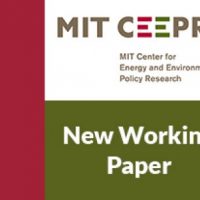
OPEC vs U.S. Shale: Analyzing the Shift to a Market-share Strategy
April 8, 2016
In 2014, global oil supply overtook demand and the oil price started to decline. In its November 2014 meeting, OPEC decided not to reduce supply and prices fell further. In its December 2015 meeting, OPEC reiterated its commitment to a “market-share†strategy. Many have opined on whether or not OPEC’s moves are sensible.
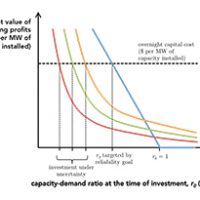
The Impact of Uncertainty on Capacity Remuneration Mechanisms
March 12, 2016
Intermittent energy resources increase the volatility of energy supply as well as the associated market clearing prices, creating uncertainty around when the system will experience “scarcityâ€â€” the very few hours of the year when capacity is strained exhibiting prices high-enough to cover a large portion of the capital and fixed operation and maintenance costs incurred by all types of installed generation capacity.

Will We Ever Stop Using Fossil Fuels?
February 5, 2016
On the heels of a historic climate agreement in Paris, a new study published in the Journal of Economic Perspectives sheds light on the world’s ability to stop using fossil fuels. Its conclusion: fossil fuel consumption is likely to continue growing without clear and decisive global action to introduce an adequate price on greenhouse gas emissions and increase research and development spending toward clean energy technologies.
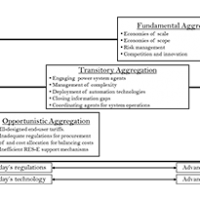
A Review of the Value of Aggregators in Electricity Systems
January 17, 2016
Electricity systems are currently facing significant changes as a result of the deployment of information and communication technologies (ICTs), power electronics, and distributed energy resources (e.g., gas-fired distributed generation, solar PV, small wind farms, electric vehicles, energy storage, and demand response). Given the small scale of these technologies, many industry stakeholders claim that aggregators can create economic value by enabling DERs to provide these services at scale.




